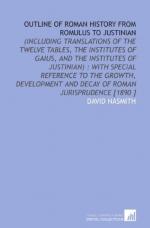This provision sometimes is placed in Table III by scholars.
[27] This is an exclusively patrician type of wedding, wherein is made a mutual offering of bread in the presence of a priest and ten witnesses.
[28] This type of wedlock, used originally by plebeians, is a fictitious sale, by which a woman is freed from either patria potestas or tutela. It comes perhaps from the primitive custom of bride-purchase.
[29] This method explains how a wife can remain married to a husband without remaining in his manus (rights of possession). If the usus be interrupted, the time of the usus must begin afresh, because the previous possession (usus) is considered as cancelled.
[30] Apparently tignum, as “timber” in English covers material for construction, includes every kind of material used in buildings and in vine-yards.
[31] This strip is reserved as a path between any two estates belonging to different owners. Both owners can walk on the whole space, but neither owner can claim possession of the strip through continued usage.
[32] In view of the ancient tradition that the decemvirs sent to Athens a committee to study the laws written by Solon (c. 639 B.C.—c. 559 B.C.) for the Athenians (Livy, op. cit., III. 33. 5), it may not be out of place to record what Gaius (ob. c. 180 A.D.) reports about marking boundaries (Digesta, X. 1. 13): “We must remember in an action for marking boundaries (actio finium regundorum) that we must not overlook that old provision which was written in a manner after the pattern of the law which at Athens Solon is said to have given. For there it is thus: ’If any man erect a rough wall alongside another man’s estate, he must not overstep the boundary; if he build a massive wall, he must leave one foot to spare; a building, two feet; if he dig a trench or a hole, he must leave a space equal or about equal in breadth to depth: if a well, six feet; an olive tree or a fig tree he must plant nine feet from the other man’s property and any other trees five feet.’”
While there is no evidence whatever that any enactment of the Twelve Tables reproduced in any form the terms of the Athenian statute here quoted, still the Twelve Tables may have contained some such provisions.
[33] What were these conditions we know not; all that we have from this item are the unbracketed words, which are quoted as examples of how words change their meanings and which are assigned to the Twelve Tables.
[34] Some scholars suppose that only branches over fifteen feet above ground are meant. In any case the idea is that shade from the tree may not damage a neighboring estate.
[35] We know that this item was interpreted to include prose as well as verse.
[36] Slander and libel are not distinguished from each other in Roman Law.
[37] The severity of the penalty indicates that the Romans viewed offence not as a private delict but as a breach of the public peace.




